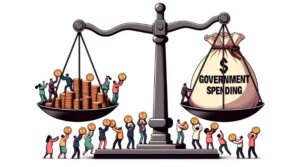Washington State’s Tax Surge: A Call for Fiscal Responsibility

In a dramatic bid to address a looming budget shortfall, Washington State is enforcing drastic tax increases on megacorporations. With an expected deficit ranging from $12 billion to $16 billion over the next four years, officials are scrambling to close the gap—a gap that echoes years of burgeoning state expenditure, which has escalated by a staggering 40% in just the past four years.
New Tax Framework Under HB 2081
The recently introduced House Bill 2081 significantly restructures the Business and Occupation (B&O) tax. This legislation targets global corporations with revenues exceeding $25 billion, hiking their tax rate from 1.22% to an eye-popping 7.5%. The cap on payments will also surge from $9 million to $75 million, largely impacting industry giants like Microsoft and Amazon. These tax hikes represent a clear move to capitalize on the financial heft of big tech companies to boost state coffers.
Furthermore, businesses earning over $5 million annually will also process a tax uptick, with rates climbing from 1.75% to 2.1%. New temporary surcharges will apply to companies generating over $250 million in taxable income in Washington State, posing an additional financial burden on businesses already grappling with current economic conditions.
Sales Tax and Capital Gains Revisions
But that’s not all. Senate Bill 5814 mandates an increase in the state sales tax from 6.5% to 10.6%. This revision extends to digital automated services that were previously exempt, aiming for an ambitious revenue target of $2.9 billion.
Moreover, tax reforms under Senate Bill 5813 will introduce a new tier for capital gains over $1 million, combining a 7% base tax with an additional 2.9% surtax, intending to rake in an estimated $321.6 million.
The Vicious Cycle of Increased Spending
It’s crucial to recognize that this tax surge isn’t merely a reaction to economic challenges; it’s a signal of deeper fiscal mismanagement. Despite a 34% increase in tax revenue, or an additional $18 billion since 2019, the state continues to pursue costly social programs, many of which remain underfunded. For instance, childcare subsidy expansions passed in 2021 have yet to be fully financed, while state-funded pre-K expansions also face budget delays.
A Shift in Fiscal Responsibility
Interestingly, Washington state was operating with a $14 billion surplus just three years ago. However, due to rampant increases in spending—40% in a mere four years—the financial landscape has flipped dramatically. The taxes have skyrocketed 99% over the last decade, while state expenditures have surged 114% during that period.
In December, Washington’s leaders froze non-essential spending, yet many believe that the real solution lies not just in revenue hikes but also in reevaluating expenditures. A wealth tax is even being discussed, but amid all these proposals, cutting spending remains a distant consideration.
Conclusion: A Call for Sustainable Solutions
Taxpayers are ultimately left holding the bag for the state’s fiscal mismanagement, leading to a stark reminder that more revenue generation should not come at the expense of burdensome taxation. At Extreme Investor Network, we advocate for sustainable fiscal policies that emphasize responsibility and balanced budgets.
As Washington State navigates this complex economic landscape, the focus should shift from punitive taxation to wise spending strategies, preserving citizens’ financial freedom while ensuring fiscal health for the state.
Stay informed with us, because understanding the implications of these legislative changes is crucial for both investors and citizens alike. The decisions made today will shape tomorrow’s economic landscape.

